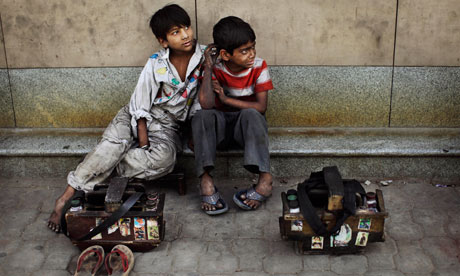Archived_Member16
SPNer
UN: World will miss economic benefit of 1.8 billion young people
Population report says lack of education, infrastructure and jobs will mean a generation's potential will be wasted
Fiona Harvey, environment correspondent
guardian.co.uk, Wednesday 26 October 2011 13.32 BST

Shoeshine boys awaiting customers in New Delhi, India. Photograph: Kevin Frayer/AP
The world is in danger of missing a golden opportunity for development and economic growth, a "demographic dividend", as the largest cohort of young people ever known see their most economically productive years wasted, a major UN population report warned on Wednesday.
The potential economic benefits of having such a large global population of young people will go unfulfilled, as a generation suffers from a lack of education, and investment in infrastructure and job creation, the authors said.
"When young people can claim their rights to health, education and decent working conditions, they become a powerful force for economic development and positive change. "This opportunity [for] a demographic dividend is a fleeting moment that must be claimed quickly or lost," said the UN Population Fund (UNFPA), in its Global Population Report, published just days before the UN forecasted the world population will pass 7 billion. Of this 7 billion, 1.8 billion are aged between 10 and 24, and 90% of those live in the developing world.
The report also reveals average life expectancy across the globe has risen by 20 years since the 1950s, from 48 to 68, as healthcare and nutrition have improved, while infant mortality has fallen fast, from 133 deaths per 1,000 births in the 1950s to 46 per 1,000 today.
These successes area a cause to celebrate, the United Nations said. Fertility has also halved, from 6 births per woman to 2.5 over the same period, though there are stark regional differences – fertility is 1.6 births per woman in east Asia but 5 per woman in some parts of Africa.
The report found a "vicious cycle" of extreme poverty, food insecurity and inequality leading to high death rates, that in turn encourages high birth rates. Only by investing in health and education for women and girls can countries break the cycle, as improving living conditions will allow parents to be more confident that their children will survive, and therefore have smaller families.
Crucial to this will be allowing women and girls greater freedom and equality, in order to make their own choices about fertility. Hundreds of millions of women would prefer to have smaller families, but are unable to exercise this preference owing to a culture of repression.
"Governments that are serious about eradicating poverty should also be serious about providing the services, supplies and information that women need to exercise their reproductive rights," said Babatunde Osotimehin, executive director of the UNFPA. On the empowerment of woman, he said at a press conference in London: "we have come a long way, but we are not there yet. There is no group that gives up power voluntarily. Men will not give up power to women voluntarily. Women have to fight. Women need to work together."
One way of doing so highlighted in the report is to provide a good level of sex education to adolescents, and access to modern methods of contraception.
The report said: "When women have equal rights and opportunities in their societies and when girls are educated and healthy, fertility rates fall ... the empowerment of women is not simply an end in itself, but also a step towards eradicating poverty."
The difference between a future of high fertility rates and one where people are better able to choose is stark: if fertility rates in areas of high population growth come down towards the global average, the world will reach a global population of about 9.3bn in 2050, and about 10bn in 2100. But if fertility rates remain high in the most populous countries, the 2100 population will be more than 15bn.
Osotimehin said countries must do more to help themselves: "It is unacceptable for countries to rely on donor money for reproductive health. The welfare of their people is their mandate." He said it would cost only $2bn to give access to family planning to the 250 million women who would like it but lack access. "The budget of the average developing country does not give enough money to issues of women and reproductive health. That has to change. If it does not change, it becomes unsustainable."
But he also said donors were failing to make sufficient commitments. "Family planning has not been funded as it should have been. Donors need to provide resources ... there has been a reduction [in money made available]."
Osotimehin also said at the press conference that the opportunity had been missed to educate people on reproductive health and family planning, during a drive to prevent HIV infection, echoing comments he made to the Guardian earlier in the month.
With high population growth, many scientists predict thatthe pressure on food and agricultural productivity and other natural resources may become intolerable, and conditions for the poorest people will deteriorate further, rather than improving.
John Cleland, of the London School of Hygiene and Tropical Medicine, said: "The escape from poverty and hunger is made more difficult by rapid population growth."
Rapid growth will also exacerbate the impact of other global problems, such as climate change and other environmental impacts. Steven Sinding, a population expert at Columbia University, said: "The pace of growth poses enormous challenges for many of the poorest countries, which lack the resources not only to keep up with demand for infrastructure, basic health and education services and job opportunities for the rising number of young people, but also to adapt to climate change."
Separately on Wednesday, the Official for National Statistics forecast that the UK population would grow to 70 million by 2020, up from 62.3 million in 2010.
© 2011 Guardian News and Media Limited or its affiliated companies. All rights reserved.
source: http://www.guardian.co.uk/environment/2011/oct/26/un-economic-benefit-young-people

